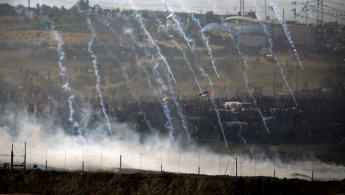Israel: Human rights laws ‘do not apply to Great Return Marches’
Israel has defended its disproportionate use of violence against peaceful protesters involved in the the Great Return March demonstrations after facing a legal challenge from international rights groups, suggesting human rights laws do not apply to what it described as "acts of war”.
Israel’s remarks came in response to several High Court petitions put forward by human rights groups demanding the end to the use of live ammunition against peaceful protestors, which have seen 48 Palestinians killed and thousands injured over five weeks of demonstrations.
Tel Aviv claimed the protests were a "state of war", and rules of engagement were applied that were consistent with Israeli and international law for such a circumstance.
Read more: The wrong story: Palestine, Israel and the media
The state said it was "opposed to applying human rights laws during an armed conflict," and that the Red Cross recognises that Israel is not committed to replacing them [laws] during armed confrontations."
Israel also claimed that during the protests, "Hamas carried out acts of aggression against Israel" which prompted "sustained armed confrontation between the two sides".
Twitter Post
|
Despite many pointing out Israel's implication in this line of argument that the border protests took place on equal playing field, Palestinians are limited to burning tyres and throwing stones and molotov coktails, whereas the technologically advanced Israeli army lined up hundreds of snipers along the heavily fortified border and used drones to strike crowds with tear gas.
Israel's State Prosecutor's Office said it differentiates between people demonstrating and people trying to breach the border into Israel to attack civilians and soldiers, Haaretz reported, but videos that surfaced online prove otherwise.
The petitions were put forward by six different human rights groups including Adalah, Yesh Atid, the Association for Civil Rights in Israel and Gisha.
Pompeo and the P-word: Undoing decades of diplomacy with Palestine
The petitions state that in the case of violent acts or attempts to breach the border, these should be treated as civil disturbances, in which it is only legally permissible to open fire if there is a immediate threat to human life.
Amnesty International has called on governments to impose a comprehensive arms embargo on Israel following its disproportionate response to the demonstrations which it calls "a murderous assault against protesting Palestinians as its armed forces continue to kill and maim demonstrators who pose no imminent threat to them".
Despite international condemnation, Israel has said it will not investigate the killing of protesters in Gaza and threatened to "expand" its response.
Meanwhile, the UN has warned that Gaza would be "unliveable" by 2020 due to Israel's blockade, which began after Hamas took control of the Strip in 2007.





 Follow the Middle East's top stories in English at The New Arab on Google News
Follow the Middle East's top stories in English at The New Arab on Google News
![The UAE is widely suspected of arming the RSF militia [Getty]](/sites/default/files/styles/image_330x185/public/2024-11/GettyImages-472529908.jpg?h=69f2b9d0&itok=Yauw3YTG)
![Netanyahu furiously denounced the ICC [Getty]](/sites/default/files/styles/image_330x185/public/2024-11/GettyImages-2169352575.jpg?h=199d8c1f&itok=-vRiruf5)
![Both Hamas and the Palestinian Authority welcomed the ICC arrest warrants [Getty]](/sites/default/files/styles/image_330x185/public/2024-11/GettyImages-2178351173.jpg?h=199d8c1f&itok=TV858iVg)